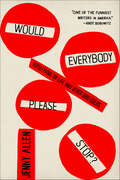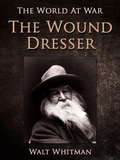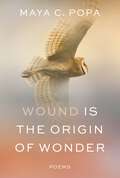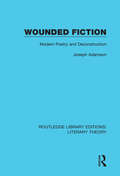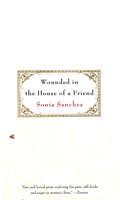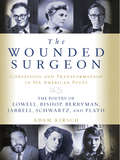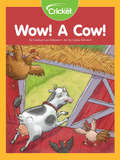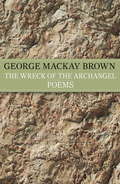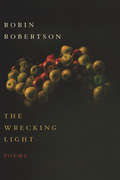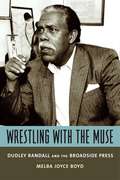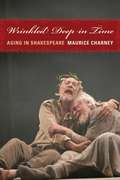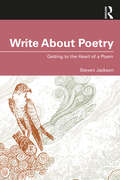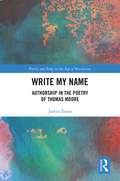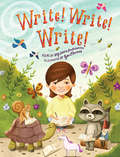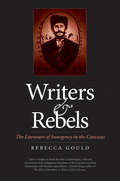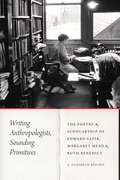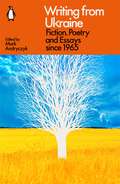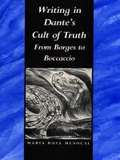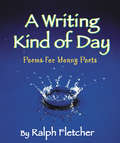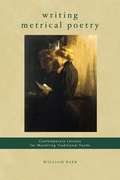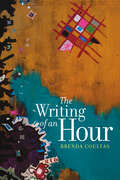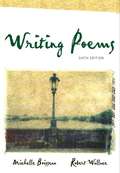- Table View
- List View
Would Everybody Please Stop?: Reflections on Life and Other Bad Ideas
by Jenny AllenFinalist for the Thurber Prize for American Humor"One of the funniest writers in America." That’s what The New Yorker’s Andy Borowitz calls Jenny Allen—and with good reason. In her debut essay collection, the longtime humorist and performer declares no subject too sacred, no boundary impassable.With her eagle eye for the absurd and hilarious, Allen reports from the potholes midway through life’s journey. One moment she’s flirting shamelessly—and unsuccessfully—with a younger man at a wedding; the next she’s stumbling upon X-rated images on her daughter’s computer. She ponders the connection between her ex-husband’s questions about the location of their silverware, and the divorce that came a year later. While undergoing chemotherapy, she experiments with being a “wig person.” And she considers those perplexing questions that we never pause to ask: Why do people say “It is what it is”? What’s the point of fat-free half-and-half ? And haven’t we heard enough about memes?Jenny Allen’s musings range fluidly from the personal to the philosophical. She writes with the familiarity of someone telling a dinner party anecdote, forgoing decorum for candor and comedy. To read Would Everybody Please Stop? is to experience life with imaginative and incisive humor.
The Wound Dresser: A Series Of Letters, Written From The Hospitals In Washington, During The War Of The Rebellion (classic Reprint) (The World At War)
by Walt WhitmanWalt Whitman’s “The Wound-Dresser” is a sixty-five-line free-verse poem in four sections describing the suffering in the Civil War hospitals and the poet’s suffering, faithfulness to duty, and developing compassion as he tended to soldiers’ physical wounds and gave comfort. Published at war’s end, the poem opens with an old veteran speaking, imaginatively suggesting some youths gathered about who have asked him to tell of his most powerful memories. The children request stories of battle glory, but the poet quickly dismisses these as ephemeral. He then narrates a journey through a military hospital such as Whitman experienced in Washington, D.C., during the second half of the war. (Excerpt from Wikipedia)
Wound Is the Origin of Wonder: Poems
by Maya C. Popa“This book is an astonishment. In ravishing, formally exploratory poems, Maya C. Popa wields the lyric like a reparative scalpel, evoking wonder and woundedness in equal measure: ‘It’s plain we didn’t see / the future coming,’ she announces. Searching for a spring that brings renewal, lamenting ‘snow / that vanishes with touch,’ her poems register a unique combination of imperilment and possibility, with imagistic precision one can’t forget: ‘A faint hiss—that is / your own life now, hurrying / from one light to another.’ Wound Is the Origin of Wonder reflects to us our own historical moment with unusual clarity, even as its lyric exploration of psychic and social landscapes stand outside of time. This is a book I will return to.” —Meghan O’Rourke Award-winning poet Maya C. Popa suggests that our restless desires are inseparable from our mortality in this pressing and precise collection. Rooting out profound meaning in language to wrench us from the moorings of the familiar and into the realm of the extraordinary, the volume asks, how do we articulate what’s by definition inarticulable? Where does sight end and imagination begin? Lucid and musically rich, these poems sound an appeal to a dwindling natural world and summon moments from the lives of literary forbearers—John Milton’s visit to Galileo, a vase broken by Marcel Proust—to unveil fresh wonder in the unlikely meetings of the past. Popa dramatizes the difficulties of loving a world that is at once rich with beauty and full of opportunities for grief, and reveals that the natural arc of wonder, from astonishment to reflection, more deeply connects us with our humanity.
The Wounded Breakfast
by Russell EdsonThe wounded Breakfast is a famed collection of poems by Russell Edson, a dark and kind of twisted work.
Wounded Fiction: Modern Poetry and Deconstruction (Routledge Library Editions: Literary Theory #2)
by Joseph AdamsonThis book, first published in 1988, does not concern the theory of poetry so much as the poetry of theory: a poetry that theorizes, that has a "view" on things, that thinks. What or what things does poetry think about, and what do we mean by thinking? The author attempts to answer these questions by examining the work of three poets – Wallace Stevens, César Vallejo, and René Char – and reflects upon the poetry itself. This title will be of interest to students of literature and literary theory.
Wounded in the House of a Friend
by Sonia SanchezRenowned African-American poet Sonia Sanchez explores the pain, self-doubt, and anger that emerge in women's lives: an unfaithful life partner, a brutal rape, the murder of a woman by her granddaughter, the ravages of drugs. Sanchez transforms the unspoken and sometimes violent betrayals of our lives into a liberating vision of connection in emotional redemption, compassion, and self-fulfillment.
The Wounded Surgeon: The Poetry of Lowell, Bishop, Berryman, Jarrell, Schwartz, and Plath
by Adam Kirsch"One of the most promising young poet-critics in America" (Los Angeles Times) examines a revolutionary generation of poets. Robert Lowell, Elizabeth Bishop, Sylvia Plath, John Berryman, Randall Jarrell, and Delmore Schwartz formed one of the great constellations of talent in American literature. In the decades after World War II, they changed American poetry forever by putting themselves at risk in their poems in a new and provocative way. Their daring work helped to inspire the popular style of poetry now known as "confessional." But partly as a result of their openness, they have become better known for their tumultuous lives--afflicted by mental illness, alcoholism, and suicide--than for their work. This book reclaims their achievement by offering critical "biographies of the poetry"--tracing the development of each poet's work, exploring their major themes and techniques, and examining how they transformed life into art. An ideal introduction for readers coming to these major American poets for the first time, it will also help veteran readers to appreciate their work in a new light.
Wow! A Cow!
by Lindsay Lee JohnsonSomeone leaves the barn door open and there's chaos. Find out how Blue the dog comes to the rescue.
The Wreck of the Archangel
by George BrownThis collection of the poetry of George Mackay Brown centres on the theme of journeys - including an ill-fated 19th century trip ending off the Orkney island of Westray, from which the book takes its title.
The Wreck of the Archangel
by George Mackay Brown George Mackay BrownThis collection of the poetry of George Mackay Brown centres on the theme of journeys - including an ill-fated 19th century trip ending off the Orkney island of Westray, from which the book takes its title.
The Wrecking Light: Poems
by Robin RobertsonShortlisted for the T.S. Eliot Prize, the Scottish poet’s fourth collection shimmers with “an oneiric charge and intensity” (Guardian, UK).The Wrecking Light is an intense, moving, bleakly lyrical, and at times shocking book. These poems are written with the authority of classical myth, yet sound utterly contemporary. The poet’s gaze—whether on the natural world or the details of his own life—is unflinching and clear, its utter seriousness leavened by a wry, dry, and disarming humor.Alongside fine translations from Neruda and Montale and dynamic retellings of stories from Ovid, the poems here pitch the power and wonder of nature against the frailty and failure of human beings. This is a book of considerable grandeur and sweep that confirms Robertson as one of the most arresting and powerful poets at work today.
Wrestling with the Muse: Dudley Randall and the Broadside Press
by Melba Joyce BoydAnd as I groped in darkness and felt the pain of millions,gradually, like day driving night across the continent,I saw dawn upon them like the sun a vision.—Dudley Randall, from "Roses and Revolutions"In 1963, the African American poet Dudley Randall (1914–2000) wrote "The Ballad of Birmingham" in response to the bombing of a church in Alabama that killed four young black girls, and "Dressed All in Pink," about the assassination of President Kennedy. When both were set to music by folk singer Jerry Moore in 1965, Randall published them as broadsides. Thus was born the Broadside Press, whose popular chapbooks opened the canon of American literature to the works of African American writers. Dudley Randall, one of the great success stories of American small-press history, was also poet laureate of Detroit, a civil-rights activist, and a force in the Black Arts Movement. Melba Joyce Boyd was an editor at Broadside, was Randall's friend and colleague for twenty-eight years, and became his authorized biographer. Her book is an account of the interconnections between urban and labor politics in Detroit and the broader struggles of black America before and during the Civil Rights era. But also, through Randall's poetry and sixteen years of interviews, the narrative is a multipart dialogue between poets, Randall, the author, and the history of American letters itself, and it affords unique insights into the life and work of this crucial figure.
Wrinkled Deep in Time: Aging in Shakespeare
by Maurice CharneyShakespeare was acutely aware of our intimate struggles with aging. His dramatic characters either prosper or suffer according to their relationship with maturity, and his sonnets eloquently explore time's ravaging effects. "Wrinkled deep in time" is how the queen describes herself in Antony and Cleopatra, and at the end of King Lear, there is a tragic sense that both the king and Gloucester have acquired a wisdom they otherwise lacked at the beginning of the play. Even Juliet matures considerably before she drinks Friar Lawrence's potion, and Macbeth and his wife prematurely grow old from their murderous schemes.Drawing on historical documents and the dramatist's own complex depictions, Maurice Charney conducts an original investigation into patterns of aging in Shakespeare, exploring the fulfillment or distress of Shakespeare's characters in combination with their mental and physical decline. Comparing the characterizations of elderly kings and queens, older lovers, patriarchal men, matriarchal women, and the senex-the stereotypical old man of Roman comedy-with the history of life expectancy in Shakespeare's England, Charney uncovers similarities and differences between our contemporary attitudes toward aging and aging as it was understood more than four hundred years ago. From this dynamic examination, a new perspective on Shakespeare emerges, one that celebrates and deepens our knowledge of his subtler themes and characters.
Write About Poetry: Getting to the Heart of a Poem
by Steven JacksonHow do we read poetry, compare poems, or generate observations into a thoughtful response? Write About Poetry is an invaluable reference book and skills guide for students of poetry. Featuring model essays, a glossary of technical terms, and additional practice for student engagement, this volume provides students with a clear and concise guide to: • reading unseen poems with confidence • developing general observations into formal, structured written responses • fostering familiarity with some of the great poets and poems in literary history Drawing on years of teaching experience, Steven Jackson delivers the background, progressive methodology, and practical essay writing techniques essential for understanding the fundamental steps of poetry analysis.
Write My Name: Authorship in the Poetry of Thomas Moore (Poetry and Song in the Age of Revolution)
by Justin TonraWrite My Name: Authorship in the Poetry of Thomas Moore is the first monograph devoted to Moore’s poetry. The focus of the book is on Moore’s poetry and differing formulations of authorship therein. Its scope comprises poetic publications from Moore’s early career, from his Romantic Orientalist writings, and from selected musical works, and political and satirical verse. It shares the strong historicist awareness of much previous scholarship on Moore, but combines this with a range of new and interdisciplinary contexts that are of increasing interest to scholarship in the twenty-first century, and which are rarely adopted as frameworks for viewing Moore’s work: digital humanities, book history, legal history, and textual theory. Ultimately, the book argues for the value of attending to neglected aspects of Moore’s work through analysis of his shifting modes of authorship and their various motivations
Write! Write! Write!: Namibia Edition. Your Travel Diary To Write In, Fill Out And Style Yourself For All Countries
by Amy Ludwig VanDerwaterA NCTE Notable Poetry BookTwenty-two poems capture the amazing power of writing and will inspire even the most reluctant writer to begin putting words to paper.Write! Write! Write! is a poetry collection that explores every stage and every aspect of the writing process, from learning the alphabet to the thrilling moment of writing a thought for the first time, from writer's block to finding inspiration, and from revision to stapling your finished work into a book. These poems also celebrate how writing teaches patience, helps express opinions, and allows us to imagine the impossible. This book, brimming with imagination and wonder, will leave readers eager to grab a pen, pencil, or keyboard--and write!
Writers and Rebels: The Literature of Insurgency in the Caucasus
by Rebecca Ruth GouldSpanning the period between the end of the Russo-Caucasian War and the death of the first female Chechen suicide bomber, this groundbreaking book is the first to compare Georgian, Chechen, and Daghestani depictions of anticolonial insurgency. Rebecca Gould draws from previously untapped archival sources as well as from prose, poetry, and oral narratives to assess the impact of Tsarist and Soviet rule in the Islamic Caucasus. Examining literary representations of social banditry to tell the story of Russian colonialism from the vantage point of its subjects, among numerous other themes, Gould argues that the literatures of anticolonial insurgency constitute a veritable resistance--or "transgressive sanctity"--to colonialism.
Writing Anthropologists, Sounding Primitives: The Poetry and Scholarship of Edward Sapir, Margaret Mead, and Ruth Benedict (Critical Studies in the History of Anthropology)
by A. Elisabeth ReichelWriting Anthropologists, Sounding Primitives re-examines the poetry and scholarship of three of the foremost figures in the twentieth-century history of U.S.-American anthropology: Edward Sapir, Margaret Mead, and Ruth Benedict. While they are widely renowned for their contributions to Franz Boas&’s early twentieth-century school of cultural relativism, what is far less known is their shared interest in probing the representational potential of different media and forms of writing. This dimension of their work is manifest in Sapir&’s critical writing on music and literature and Mead&’s groundbreaking work with photography and film. Sapir, Mead, and Benedict together also wrote more than one thousand poems, which in turn negotiate their own media status and rivalry with other forms of representation. A. Elisabeth Reichel presents the first sustained study of the published and unpublished poetry of Sapir, Mead, and Benedict, charting this largely unexplored body of work and relevant selections of the writers&’ scholarship. In addition to its expansion of early twentieth-century literary canons, Writing Anthropologists, Sounding Primitives contributes to current debates about the relations between different media, sign systems, and modes of sense perception in literature and other media. Reichel offers a unique contribution to the history of anthropology by synthesizing and applying insights from the history of writing, sound studies, and intermediality studies to poetry and scholarship produced by noted early twentieth-century U.S.-American cultural anthropologists.
Writing from Ukraine: Fiction, Poetry and Essays since 1965
by Mark AndryczykA selection of fifteen of Ukraine's most important, dynamic and entertaining contemporary writersUnder USSR rule, the subject matter and style of literary expression in Ukraine was strictly controlled and censored. But once Ukraine gained independence in 1991 its literary scene flourished, as the moving and delightful poems, essays and extracts collected here show. There are fifteen authors included in this book, both established and emerging, and in this anthology we see them grappling with history and the future, with big questions and small moments. From essays about Chernobyl to poetry about Robbie Williams, from fiction discussing Jimmy Hendrix live in Lviv to underground Ukrainian poetry of the Soviet era, WRITING FROM UKRAINE offers a unique window into a rich culture, a chance to experience a particularly Ukrainian sensibility and to celebrate Ukraine's nationhood, as told by its writers.
Writing in Dante’s Cult of Truth: From Borges to Bocaccio
by María Rosa MenocalUsing the works of Dante as its critical focus, María Rosa Menocal's original and imaginative study examines questions of truth, ideology, and reality in poetry as they occur in a series of texts and in the relationship between those texts across time. In each case, Menocal raises theoretical issues of critical importance to contemporary debates regarding the structure of literary relations.Beginning with a reading of La vita nuova and the Commedia, this literary history of poetic literary histories explores the Dantean poetic experience as it has been limited and rewritten by later poets, particularly Petrarch, Boccaccio, Borges, Pound, Eliot, and the all but forgotten Silvio Pellico, author of Le mie prigioni. By blending discussions of Dante's own marriage of literature and literary history with those investigations into the imitative qualities of later works, Writing in Dante's Cult of Truth presents an intertextual literary history, one which seeks to maintain the uncanniness of literature, while imagining history to be neither linear nor clearly distinguishable from literature itself.
A Writing Kind of Day: Poems for Young Poets
by Ralph FletcherIt's easy to make one, lying on your back in the newest snow. you move your arms like wings. Later you forget about your creation, go inside for a mug of hot chocolate. That's when she rises from the snow takes a feathery breath, tries out her wings. So begins a poem about making a snow angel, but it might also refer to the mysterious way that a poem comes into being and takes on a life of its own. <P><P>In this new collection, Ralph Fletcher shows us how you can write a poem about almost anything: a baby sister, a Venus's-flytrap, a failing grandmother, a squished squirrel, grammar homework, and more. These poems take us inside the creative process as they reveal both the playfulness and the power of poetry. More than anything, they invite us to pick up pen and paper and write some poems of your own.
Writing Metrical Poetry: Contemporary Lessons For Mastering Traditional Forms
by William BaerWrite poetry in the great metrical tradition of Dante, Shakespeare, Dickinson, Frost, and the poets of the current Formalist revival. In this contemporary guide, you'll learn how to write metrical poetry in all the major forms, from blank verse and quatrains to sonnets and villanelles. Each chapter provides step-by-step instruction that's accessible and easy to understand for even the beginning poet.
The Writing of an Hour (Wesleyan Poetry Series)
by Brenda CoultasWhat actually happens within the revolution of the clock's hands? In The Writing of an Hour the poet considers the effort and the deliberateness that brings her to her desk each day. Despite domestic and day job demands and widespread lockdown, Coultas forges connections to the sublime and wonders what it means to be from the Americas. These poems verge on the surreal, transform the quotidian, and respond anew to the marvelous. The Writing of an Hour takes the reader on a journey in four sections; from a bedroom to an improvised desk over the North Sea, where she attempts to create an artwork inside an airplane cabin flying over Greenland's rivers of ice. The Mending HourI tied one on, I mean I took my grandmother's apron, its strings and glittery rickrack and I wore it on the streets of the East Village. The apron is a cloak of superpowers, a psychic umbrella I paraded past Emma Goldman's E. 10th St. address, and rang her doorbell for a sip of water. My domestic armor is made of gingham though a woman is still considered an unelectable candidate.
Writing Poems (6th edition)
by Michelle Boisseau Robert WallaceThis book offers comprehensive coverage of the creative process and the technical aspects of writing poetry.
